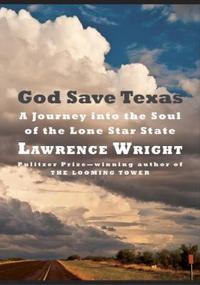 Note we’ll meet on summer hours – 9:00 Mather Center.
Note we’ll meet on summer hours – 9:00 Mather Center.
Explores the history, culture, and politics of Texas, while holding the stereotypes up for rigorous scrutiny. God Save Texas is a journey through the most controversial state in America. It is a red state in the heart of Trumpland that hasn’t elected a Democrat to a statewide office in more than twenty years; but it is also a state in which minorities already form a majority (including the largest number of Muslim adherents). The cities are blue and among the most diverse in the nation. Oil is still king but Texas now leads California in technology exports. The Texas economic model of low taxes and minimal regulation has produced extraordinary growth but also striking income disparities. Texas looks a lot like the America that Donald Trump wants to create. And Wright’s profound portrait of the state not only reflects our country back as it is, but as it was and as it might be
Category: Books (Page 7 of 10)
Note we’ll meet on summer hours – 9:00 Mather Center.
The magnificent new novel by the gifted, singular #1 New York Times bestselling author of Winter’s Tale and A Soldier of the Great War Mark Helprin’s powerful, rapturous new novel is set in a present-day Paris caught between violent unrest and its well-known, inescapable glories. Seventy-four-year-old Jules Lacour?a ma?tre at Paris-Sorbonne, cellist, widower, veteran of the war in Algeria, and child of the Holocaust?must find a balance between his strong obligations to the past and the attractions and beauties of life and love in the present. In the midst of what should be an effulgent time of life?days bright with music, family, rowing on the Seine?Jules is confronted headlong and all at once by a series of challenges to his principles, livelihood, and home, forcing him to grapple with his complex past and find a way forward. He risks fraud to save his terminally ill infant grandson, matches wits with a renegade insurance investigator, is drawn into an act of savage violence, and falls deeply, excitingly in love with a young cellist a third his age. Against the backdrop of an exquisite and knowing vision of Paris and the way it can uniquely shape a life, he forges a denouement that is staggering in its humanity, elegance, and truth. In the intoxicating beauty of its prose and emotional amplitude of its storytelling, Mark Helprin’s Paris in the Present Tense is a soaring achievement, a deep, dizzying look at a life through the purifying lenses of art and memory
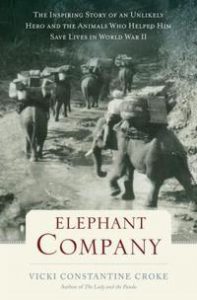 J.H. “Billy” Williams always had an affinity for animals. So, when he responded to job offer with the East India Company to work with logging elephants his family wasn’t surprised, though worried that he had already come back from World War I in one piece, would he be so lucky with India? Not only did he find his calling with the elephants in India, Billy and his elephants became war heroes. At the onset of World War II, Williams formed Elephant Company and was instrumental in defeating the Japanese in Burma and saving refugees, including on his own “Hannibal Trek.” Billy Williams became a media sensation during the war, telling reporters that the elephants did more for him than he was ever able to do for them, but his story has since been forgotten. Part biography, part war story, and part wildlife adventure, Croke delivers an utterly charming narrative and an important, little-known piece of the legacy of World War II.
J.H. “Billy” Williams always had an affinity for animals. So, when he responded to job offer with the East India Company to work with logging elephants his family wasn’t surprised, though worried that he had already come back from World War I in one piece, would he be so lucky with India? Not only did he find his calling with the elephants in India, Billy and his elephants became war heroes. At the onset of World War II, Williams formed Elephant Company and was instrumental in defeating the Japanese in Burma and saving refugees, including on his own “Hannibal Trek.” Billy Williams became a media sensation during the war, telling reporters that the elephants did more for him than he was ever able to do for them, but his story has since been forgotten. Part biography, part war story, and part wildlife adventure, Croke delivers an utterly charming narrative and an important, little-known piece of the legacy of World War II.
NYT’s Book Review: https://www.nytimes.com/2014/07/13/books/review/elephant-company-by-vicki-constantine-croke.html?_r=0
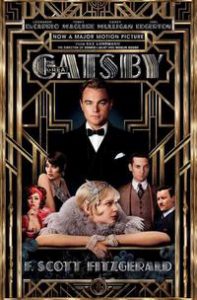 The mysterious Jay Gatsby uses his fabulous wealth to create an enchanted world fit for his former love, Daisy Buchanan, now married to Tom. Daisy, though, is a romanticised figment of his own imagination, and the extraordinary world that he creates is equally illusory. He gives lavish, legendary parties where the guests and gate-crashers enjoy free-flowing champagne and cocktails and carefree hospitality. But a more sinister reality begins to break through, as idealized romantic figures prove to have human frailties and selfish motivations, and the grandiose world of Gatsby’s creation crumbles and disillusion turns to tragedy.
The mysterious Jay Gatsby uses his fabulous wealth to create an enchanted world fit for his former love, Daisy Buchanan, now married to Tom. Daisy, though, is a romanticised figment of his own imagination, and the extraordinary world that he creates is equally illusory. He gives lavish, legendary parties where the guests and gate-crashers enjoy free-flowing champagne and cocktails and carefree hospitality. But a more sinister reality begins to break through, as idealized romantic figures prove to have human frailties and selfish motivations, and the grandiose world of Gatsby’s creation crumbles and disillusion turns to tragedy.
From wikipedia:
https://en.wikipedia.org/wiki/The_Great_Gatsby
From Vanity Fair:
https://www.vanityfair.com/news/2000/05/hitchens200005
From The New Yorker
Why “The Great Gatsby” Endures
Richard Brody
Imagine the character of James Gatz, North Dakota boy of big dreams and limited prospects, as he could have been written by a big-shouldered writer whose lifelong specialty, perhaps his most distinctive literary merit, was the depiction of natural energy yoked to ambition, put into action, and embodied in worldly accomplishment—Theodore Dreiser. His trio of novels from 1912 through 1915—“The Financier” and its sequel, “The Titan,” both about the rise, fall, and rise of the Philadelphia broker and philanderer Frank Cowperwood; and “The ‘Genius’,” about Eugene Witla’s rise from raw boy to artist and immoralist—skirt the sentimental mode of the bildungsroman to get into the tough, sinewy details of power and its mighty clashes. The very transformation of the seventeen-year-old Gatz into Gatsby, “in the service of a vast, vulgar, and meretricious beauty,” would have been a big story—the mere connection of the prodigal farm boy’s mercantile impulses and precocious aesthetic visions would have filled a chapter or two. And his five years of work “in a vague personal capacity” for the crude potentate Dan Cody, for whom “he was in turn steward, mate, skipper, secretary, and even jailor,” could have been a third of a big book: “He was left with his singularly appropriate education; the vague contour of Jay Gatsby had filled out to the substantiality of a man.”
The chronology of Gatsby’s subsequent backstory invites more invention: as a poor officer stationed in Louisville in 1917, Gatsby met and loved Daisy Fay. He shipped out in 1918, and, while he was away at war, Daisy met the wealthy Tom Buchanan, married him in June, 1919, and gave birth to their daughter, Pammy, in April, 1920. Meanwhile, Gatsby “did extraordinarily well in the war. He was a captain before he went to the front and following the Argonne battles he got his majority and the command of the divisional machine guns.” Fitzgerald, who had been in the Army but never saw active duty, doesn’t make much of Gatsby’s combat experiences, which would have made for another few chapters of grim and gruesome knowledge.
Gatsby, returning stateside after five months in a program at Oxford reserved for American officers, spent three years doing the things that made him fabulously wealthy—bootlegging, maybe some gambling, maybe some shady financial dealings, maybe some oil business—and doing it apparently by design, in the hope of impressing and wooing Daisy. That’s the business part, and the intersection of an entrepreneur’s wiles and a gangster’s ruthlessness—two realms of bold, precise, intrepid maneuvering—would make for another meaty third of a book. By the time Daisy Buchanan reëntered the picture, she would already have been receding from it, because it’s inconceivable that such a Dreiserian hero—a fiercely self-willed yet violently circumstance-buffeted man who employed his enormous vital energy in such a wide and tough range of activities—could win his fabulous East Egg mansion while suffering no greater scar on his soul than the rejection of a débutante whom he had “taken… under false pretenses” of being her social equal.
Of course, Dreiser was an intensely sexual but unromantic novelist, whose view of society was essentially biological; he understood the human varieties of animal energy to be the force of change—to be what makes life interesting, even beautiful. For Dreiser, the physical rendering of mental and visceral forces—even when the result is appalling—is the very definition of beauty. That’s just the opposite of Fitzgerald’s interest, which was in social life and its poetic implications—its poetic failings—and in the contrast between the imperatives of the world and the vast dreams and inner visions that reality can never rival, despite mad and desperate attempts to realize them.
Dreiser was fascinated by effort; Fitzgerald thought of money as manna that falls upon the chosen whose very sense of grace carries them breezily through life. That’s why Gatsby remains a cipher in the book. For Fitzgerald, it sufficed that Gatsby was rich, the “how” of it the work of a destiny that marked his brow and to which the entire world was compelled to pay homage and to yield. Daisy’s failure to yield to it thoroughly—and Gatsby’s own gracelessly pathetic exertion on its behalf—are the cankers that burn through the story and turn it tragic, though Fitzgerald always elevates the shattered romantic perfection of nature’s true aristocrats and heroes.
Fitzgerald’s mythologizing of the social whirl, his casting of American types as archetypes, his framing of psychology as destiny, of style as divine grace, captured its moment. He offered glamour along with compassion and consolation, a sense of sad magic along with the expansive glow of romance. It took a few decades for “The Great Gatsby” to take root because it awaited another age of postwar prosperity—albeit one that was growing a conscience, a sense of self-doubt, of introspection and guilt that a noirish 1949 adaptation of “Gatsby” shows. The novel was adapted again in 1974, when a shambling era in thrall to the natural self began to rummage through the past in search of style.
And it’s back now, in another glittering age of incommensurable inequality, where, as my colleague George Packer recently wrote, “The fetish that surrounds Google Glass or the Dow average grows ever more hysterical as the economic status of the majority of Americans remains flat.” “Gatsby” exults in the grand, lustrous brightness, in the irresistible allure and cavalier freedom of wealth, even as it reveals its reckless—or overmeditated—menace. But it doesn’t lionize the exertion itself, which, in the wrong hands, runs the risk of veering into a Randroid hymn to supposedly self-made captains of industry. “The Great Gatsby” is, above all, a novel of conspicuous consumption—not even of appetite but of the ineluctable connection between wealth and spectacle. The central story of that storied age is slender, sleek, and graceful, neither depicting effort nor bearing its marks.
Long before the novel found its enduring place in American letters, it was already a movie, one made by a character of real-life myth of whom Fitzgerald wrote in one of his final stories. “Citizen Kane” is richer in the spirit of true expansiveness and dubious grandeur, of exorbitant pomp, mad desire, and incurable need than any direct adaptation of the book has been; it wouldn’t have taken more than a few tweaks to turn the young Orson Welles, playing the young Charles Foster Kane, into the cinema’s ultimate and definitive Gatsby.
I’m impatient to see Leonardo DiCaprio’s version; his own deflective opacity was at its most effective in another elusive role, that of Frank Abagnale, Jr., in Steven Spielberg’s “Catch Me if You Can.” And Pammy Buchanan would be nearly ninety-three. Perhaps Baz Luhrmann persuaded Olivia de Havilland or Joan Fontaine to make a return in an epilogue that would bring the novel briefly into the present day. I’ll report back.
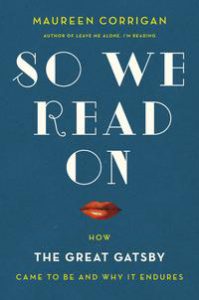
The “Fresh Air” book critic investigates the enduring power of The Great Gatsby — “The Great American Novel we all think we’ve read, but really haven’t.” Conceived nearly a century ago by a man who died believing himself a failure, it’s now a revered classic and a rite of passage in the reading lives of millions. But how well do we really know The Great Gatsby? As Maureen Corrigan, Gatsby lover extraordinaire, points out, while Fitzgerald’s masterpiece may be one of the most popular novels in America, many of us first read it when we were too young to fully comprehend its power. Offering a fresh perspective on what makes Gatsby great-and utterly unusual-So We Read On takes us into archives, high school classrooms, and even out onto the Long Island Sound to explore the novel’s hidden depths, a journey whose revelations include Gatsby’s surprising debt to hard-boiled crime fiction, its rocky path to recognition as a “classic,” and its profound commentaries on the national themes of race, class, and gender. With rigor, wit, and infectious enthusiasm, Corrigan inspires us to re-experience the greatness of Gatsby and cuts to the heart of why we are, as a culture, “borne back ceaselessly” into its thrall. Along the way, she spins a new and fascinating story of her own
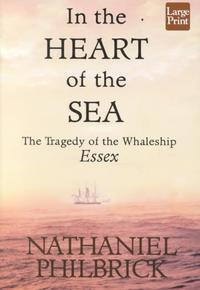 Soon to be a major motion picture starring Chris Hemsworth, Cillian Murphy, Ben Wishaw, and Brendan Gleeson, and directed by Ron Howard.The ordeal of the whaleship Essex was an event as mythic in the nineteenth century as the sinking of the Titanic was in the twentieth. In 1819, the Essex left Nantucket for the South Pacific with twenty crew members aboard. In the middle of the South Pacific the ship was rammed and sunk by an angry sperm whale. The crew drifted for more than ninety days in three tiny whaleboats, succumbing to weather, hunger, disease, and ultimately turning to drastic measures in the fight for survival. Nathaniel Philbrick uses little-known documents-including a long-lost account written by the ship’s cabin boy-and penetrating details about whaling and the Nantucket community to reveal the chilling events surrounding this epic maritime disaster. An intense and mesmerizing listen, In the Heart of the Sea is a monumental work of history forever placing the Essex tragedy in the American historical canon.
Soon to be a major motion picture starring Chris Hemsworth, Cillian Murphy, Ben Wishaw, and Brendan Gleeson, and directed by Ron Howard.The ordeal of the whaleship Essex was an event as mythic in the nineteenth century as the sinking of the Titanic was in the twentieth. In 1819, the Essex left Nantucket for the South Pacific with twenty crew members aboard. In the middle of the South Pacific the ship was rammed and sunk by an angry sperm whale. The crew drifted for more than ninety days in three tiny whaleboats, succumbing to weather, hunger, disease, and ultimately turning to drastic measures in the fight for survival. Nathaniel Philbrick uses little-known documents-including a long-lost account written by the ship’s cabin boy-and penetrating details about whaling and the Nantucket community to reveal the chilling events surrounding this epic maritime disaster. An intense and mesmerizing listen, In the Heart of the Sea is a monumental work of history forever placing the Essex tragedy in the American historical canon.
The Library has a copy of the movie.
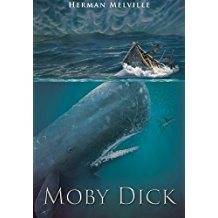 Side read: Moby Dick
Side read: Moby Dick
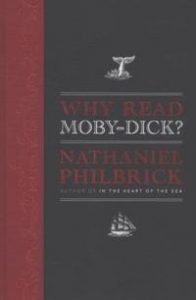
One of the greatest American novels finds its perfect contemporary champion in Why Read Moby-Dick?, Nathaniel Philbrick’s enlightening and entertaining tour through Melville’s classic. As he did in his National Book Award–winning bestseller In the Heart of the Sea, Philbrick brings a sailor’s eye and an adventurer’s passion to unfolding the story behind an epic American journey. He skillfully navigates Melville’s world and illuminates the book’s humor and unforgettable characters—finding the thread that binds Ishmael and Ahab to our own time and, indeed, to all times. An ideal match between author and subject, Why Read Moby-Dick? will start conversations, inspire arguments, and make a powerful case that this classic tale waits to be discovered anew.
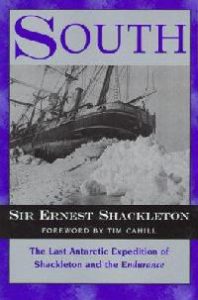 This is one of the most perilous adventure tales ever. Unbelievable – but true. I understand that business schools use it to teach crisis management. Gary
This is one of the most perilous adventure tales ever. Unbelievable – but true. I understand that business schools use it to teach crisis management. Gary
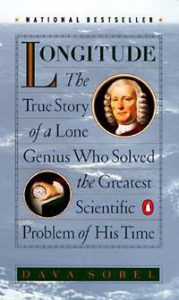 The Essex sailors knew their Latitude but not their Longitude. This is a short, interesting book on the subject. Anyone alive in the eighteenth century would have known that “the longitude problem” was the thorniest scientific dilemma of the day-and had been for centuries. Lacking the ability to measure their longitude, sailors throughout the great ages of exploration had been literally lost at sea as soon as they lost sight of land. Thousands of lives and the increasing fortunes of nations hung on a resolution. One man, John Harrison, in complete opposition to the scientific community, dared to imagine a mechanical solution-a clock that would keep precise time at sea, something no clock had ever been able to do on land. Longitude is the dramatic human story of an epic scientific quest and of Harrison’s forty-year obsession with building his perfect timekeeper, known today as the chronometer. Full of heroism and chicanery, it is also a fascinating brief history of astronomy, navigation, and clockmaking, and opens a new window on our world.
The Essex sailors knew their Latitude but not their Longitude. This is a short, interesting book on the subject. Anyone alive in the eighteenth century would have known that “the longitude problem” was the thorniest scientific dilemma of the day-and had been for centuries. Lacking the ability to measure their longitude, sailors throughout the great ages of exploration had been literally lost at sea as soon as they lost sight of land. Thousands of lives and the increasing fortunes of nations hung on a resolution. One man, John Harrison, in complete opposition to the scientific community, dared to imagine a mechanical solution-a clock that would keep precise time at sea, something no clock had ever been able to do on land. Longitude is the dramatic human story of an epic scientific quest and of Harrison’s forty-year obsession with building his perfect timekeeper, known today as the chronometer. Full of heroism and chicanery, it is also a fascinating brief history of astronomy, navigation, and clockmaking, and opens a new window on our world.
Longitude by Dava Sobel
This is pretty extraordinary. The film was made in 1916 and this was narrated in 1964 by a New Bedford historian who actually sailed on this ship, the Viola. Two parts. By Charles Salman’s
https://www.youtube.com/watch?v=iWA4HDFASAo
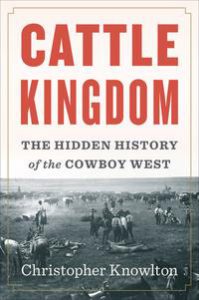 A revolutionary new appraisal of the Old West and the America it made
A revolutionary new appraisal of the Old West and the America it made
The open range cattle era lasted barely a quarter-century, but it left America irrevocably changed. These few decades following the Civil War brought America its greatest boom-and-bust cycle until the Depression, the invention of the assembly line, and the dawn of the conservation movement. It inspired legends, such as that icon of rugged individualism, the cowboy. Yet this extraordinary time and its import have remained unexamined for decades.
Cattle Kingdom reveals the truth of how the West rose and fell, and how its legacy defines us today. The tale takes us from dust-choked cattle drives to the unlikely splendors of boomtowns like Abilene, Kansas, and Cheyenne, Wyoming. We venture from the Texas Panhandle to the Dakota Badlands to the Chicago stockyards. We meet a diverse array of players—from the expert cowboy Teddy Blue to the failed rancher and future president Teddy Roosevelt. Knowlton shows us how they and others like them could achieve so many outsized feats: killing millions of bison in a decade, building the first opera house on the open range, driving cattle by the thousand, and much more. Cattle Kingdom is a revelatory new view of the Old West.
From Delancy Place:
THE BIRTH OF THE AMERICAN COWBOY — 1/08/18
Today’s selection — from Cattle Kingdom by Christopher Knowlton. In the mid-to-late 1800s, some 10 million cattle would be driven north out of Texas, the largest forced migration of animals in human history. It was the birth of the American cowboy:
“Cattle had been trailed from Texas to Missouri as early as 1842 and to California as early as 1854. … Although the maps depicting these routes suggest an orderly branch network of roads, on the ground the paths taken were often circuitous, as the drovers needed to provide water and grass for the cattle along the way. This meant following rivers and creeks and tracing the routes of old Indian and buffalo trails. The earliest endpoints were the railheads of the Union Pacific and the Missouri Pacific railroads, which were gradually extending their tentacles of track westward, now that the Civil War was over and capital was available for their expansion.
“But nothing about this trail-driving scheme turned out to be quite as easy as it looked on paper. The first challenge: a cattle drive required horses, but the freely roaming mustangs needed to be roped, corralled, and broken by a skilled broncobuster. It typically took five to six days to properly break a wild mustang. And to trail cattle north, a journey that could take three to six months, drovers needed four or five horses per cowboy.
 |
“The second challenge: the behavior and temperament of the wild Texas Longhorn itself. … It was a challenge for cowboys to round up these wild cattle. Texas Longhorns hid in the brush during the day and did most of their foraging at night. Only briefly in the summer, when the tormenting mosquitoes were out in force, did they spend the daylight hours in open areas, where they hoped to find a breeze. Most of the time the cowboys were compelled to ride into the thorny brush to flush the cattle out. But a cow with a young calf was prepared to gore a horse to defend her offspring, and the longhorn bull was notoriously ornery: ‘sullen, morose, solitary, and pugnacious;’ as one cattleman put it. ‘The longer he lived, the meaner he became.’ …
“Once a herd was assembled, the profit-seeking Texan faced his most grueling challenge: the trail drive itself, since railroads throughout the South had been badly damaged during the Civil War and had never ventured far into Texas. … It required a minimum of eight men to drive a thousand head of cattle. The trail boss usually rode a few miles ahead, scouting out water holes and good places to graze the herd. The cook followed on the mess, or chuck, wagon. …
“Two cowboys were positioned at the point of the herd and two along each swing, or flank. The two most junior cowboys brought up the rear and were known as drag riders. Their job was to keep the slow and lame cattle moving along. They were constantly subjected to dust and spatterings of the herd’s manure; they took the full brunt of its noxious odors. … [One] staple of the diet was ‘son-of-a-bitch stew,’ concocted from leftover cattle parts such as the heart, testicles, and tongue.
“On a good day, a trail drive could cover fourteen or fifteen miles, usually with a break at midday for lunch. The greatest threat facing the drovers was a stampede. It didn’t take much to spook the jumpy longhorns: lightning, the appearance of a wolf, the snap of a towel. …
“In the spring of 1867, some 35,000 head of cattle headed up the trails; the next year, 75,000; the year after that 350,000; and in 1871, some 600,000. The great migration of Texas Longhorns, the largest forced migration of animals in human history, had begun in earnest. In all, some ten million cattle would be driven north out of Texas, accompanied by half a million horses and some 50,000 cowboys.”
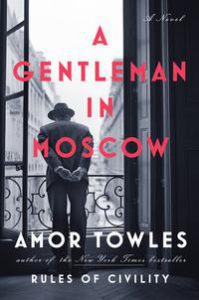 A New York Times bestseller “The same gorgeous, layered richness that marked Towles’ debut, Rules of Civility, shapes [A Gentleman in Moscow]” – Entertainment Weekly “Elegant… as lavishly filigreed as a Fabergé egg” – O, the Oprah Magazine He can’t leave his hotel. You won’t want to. From the New York Times bestselling author of Rules of Civility—a transporting novel about a man who is ordered to spend the rest of his life inside a luxury hotel In 1922, Count Alexander Rostov is deemed an unrepentant aristocrat by a Bolshevik tribunal, and is sentenced to house arrest in the Metropol, a grand hotel across the street from the Kremlin. Rostov, an indomitable man of erudition and wit, has never worked a day in his life, and must now live in an attic room while some of the most tumultuous decades in Russian history are unfolding outside the hotel’s doors. Unexpectedly, his reduced circumstances provide him entry into a much larger world of emotional discovery. Brimming with humor, a glittering cast of characters, and one beautifully rendered scene after another, this singular novel casts a spell as it relates the count’s endeavor to gain a deeper understanding of what it means to be a man of purpose. “And the intrigue! … [A Gentleman in Moscow] is laced with sparkling threads (they will tie up) and tokens (they will matter): special keys, secret compartments, gold coins, vials of coveted liquid, old-fashioned pistols, duels and scars, hidden assignations (discreet and smoky), stolen passports, a ruby necklace, mysterious letters on elegant hotel stationery… a luscious stage set, backdrop for a downright Casablanca-like drama.” – The San Francisco Chronicle From the Hardcover edition
A New York Times bestseller “The same gorgeous, layered richness that marked Towles’ debut, Rules of Civility, shapes [A Gentleman in Moscow]” – Entertainment Weekly “Elegant… as lavishly filigreed as a Fabergé egg” – O, the Oprah Magazine He can’t leave his hotel. You won’t want to. From the New York Times bestselling author of Rules of Civility—a transporting novel about a man who is ordered to spend the rest of his life inside a luxury hotel In 1922, Count Alexander Rostov is deemed an unrepentant aristocrat by a Bolshevik tribunal, and is sentenced to house arrest in the Metropol, a grand hotel across the street from the Kremlin. Rostov, an indomitable man of erudition and wit, has never worked a day in his life, and must now live in an attic room while some of the most tumultuous decades in Russian history are unfolding outside the hotel’s doors. Unexpectedly, his reduced circumstances provide him entry into a much larger world of emotional discovery. Brimming with humor, a glittering cast of characters, and one beautifully rendered scene after another, this singular novel casts a spell as it relates the count’s endeavor to gain a deeper understanding of what it means to be a man of purpose. “And the intrigue! … [A Gentleman in Moscow] is laced with sparkling threads (they will tie up) and tokens (they will matter): special keys, secret compartments, gold coins, vials of coveted liquid, old-fashioned pistols, duels and scars, hidden assignations (discreet and smoky), stolen passports, a ruby necklace, mysterious letters on elegant hotel stationery… a luscious stage set, backdrop for a downright Casablanca-like drama.” – The San Francisco Chronicle From the Hardcover edition
Here is a video tour of the Hotel Metropol (courtesy of Charles Salmans)
https://www.youtube.com/watch?v=NPkLFmUiTjo
An interview with the author by the WSJ:
https://www.youtube.com/watch?v=mUXlagGIH18
Amor Towles’ website has some interesting discussion:
http://www.amortowles.com/
Latvian Stew: Mentioned on page 97
The author points to this recipe (there are others).
PORK STEW WITH DRIED APRICOTS AND PRUNES
(Svinina v Kislo-Sladkom Souse)
SERVES 6 — 8
As the apricots and prunes cook, some of them will fall apart and thicken the sauce. Serve this stew accompanied by boiled potatoes, buttered and garnished with chopped parsley, if you like.
3 lbs. boneless pork shoulder,
trimmed and cut into 1″ pieces
Salt and freshly ground black pepper
6 tbsp. vegetable oil
6 carrots, peeled, trimmed, and
sliced crosswise
4 tbsp. tomato paste
1 cup dried apricots
1 lb. white boiling onions, peeled,
each cut into 6 wedges
1 cup pitted prunes
1. Season pork with salt and pepper. Heat 3 tbsp. of the oil in a large heavy-bottomed pot over medium-high heat. Add pork and cook, stirring occasionally, until meat releases its juices and is no longer pink all over, about 5 minutes. Add carrots and cook until slightly tender, about 5 minutes. Stir in tomato paste and 5 cups of water, then add apricots. Bring to a boil, reduce heat to medium-low, and gently simmer, uncovered, for 45 minutes.
Another recipe that looks good from Epicurious:
https://www.epicurious.com/recipes/food/views/pork-stew-with-apricots-and-prunes-2559
nbsp;
On page 133 The Count quickly notes that a number, 1,173 is not prime by using the Divisibility by 3 Theorem. That is if the sum of the digits of a number are divisible by 3 (or 9) then the number is divisible by three (or 9), hence, not prime. The book’s example: 1+1+7+3 =12 is divisible by 3 so, according to the theorem, 1,173 is divisible by 3.
Here is an informal proof.
Suppose that you have a four-digit number N that is written abcd. and a+b+c+d is divisible by 3. Then
N=1000a+100b+10c+d=(999+1)a+(99+1)b+(9+1)c+d=(999a+99b+9c)+(a+b+c+d)=3(333a+33b+3c)+(a+b+c+d)
so when you divide N by 3, you’ll get
333a+33b+3c+(a+b+c+d) /3. But since a+b+c+d was divisible by 3, the 3 in the denominator cancels out and the remainder is an integer.. Hence N is divisible by 3 and not prime.
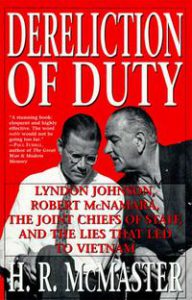 From respected Lieutenant General and Trump Administration National Security Adviser H. R. McMaster, an authoritative, highly critical analysis of the arrogance, deception, and controversial decisions at the highest level of government that led to America’s involvement in the Vietnam War. “The war in Vietnam was not lost in the field, nor was it lost on the front pages of the New York Times or the college campuses. It was lost in Washington, D.C.” —H. R. McMaster (from the Conclusion) Dereliction Of Duty is a stunning analysis of how and why the United States became involved in an all-out and disastrous war in Southeast Asia. Fully and convincingly researched, based on transcripts and personal accounts of crucial meetings, confrontations and decisions, it is the only book that fully re-creates what happened and why. McMaster pinpoints the policies and decisions that got the United States into the morass and reveals who made these decisions and the motives behind them, disproving the published theories of other historians and excuses of the participants. A page-turning narrative, Dereliction Of Duty focuses on a fascinating cast of characters: President Lyndon Johnson, Robert McNamara, General Maxwell Taylor, McGeorge Bundy and other top aides who deliberately deceived the Joint Chiefs of Staff, the U.S. Congress and the American public. McMaster’s only book, Dereliction of Duty is an explosive and authoritative new look at the controversy concerning the United States involvement in Vietnam
From respected Lieutenant General and Trump Administration National Security Adviser H. R. McMaster, an authoritative, highly critical analysis of the arrogance, deception, and controversial decisions at the highest level of government that led to America’s involvement in the Vietnam War. “The war in Vietnam was not lost in the field, nor was it lost on the front pages of the New York Times or the college campuses. It was lost in Washington, D.C.” —H. R. McMaster (from the Conclusion) Dereliction Of Duty is a stunning analysis of how and why the United States became involved in an all-out and disastrous war in Southeast Asia. Fully and convincingly researched, based on transcripts and personal accounts of crucial meetings, confrontations and decisions, it is the only book that fully re-creates what happened and why. McMaster pinpoints the policies and decisions that got the United States into the morass and reveals who made these decisions and the motives behind them, disproving the published theories of other historians and excuses of the participants. A page-turning narrative, Dereliction Of Duty focuses on a fascinating cast of characters: President Lyndon Johnson, Robert McNamara, General Maxwell Taylor, McGeorge Bundy and other top aides who deliberately deceived the Joint Chiefs of Staff, the U.S. Congress and the American public. McMaster’s only book, Dereliction of Duty is an explosive and authoritative new look at the controversy concerning the United States involvement in Vietnam
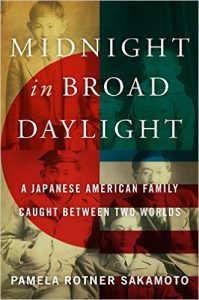 Meticulously researched and beautifully written, the true story of a Japanese American family that found itself on opposite sides during World War II—an epic tale of family, separation, divided loyalties, love, reconciliation, loss, and redemption—this is a riveting chronicle of U.S.–Japan relations and the Japanese experience in America.
Meticulously researched and beautifully written, the true story of a Japanese American family that found itself on opposite sides during World War II—an epic tale of family, separation, divided loyalties, love, reconciliation, loss, and redemption—this is a riveting chronicle of U.S.–Japan relations and the Japanese experience in America.
After their father’s death, Harry, Frank, and Pierce Fukuhara—all born and raised in the Pacific Northwest—moved to Hiroshima, their mother’s ancestral home. Eager to go back to America, Harry returned in the late 1930s. Then came Pearl Harbor. Harry was sent to an internment camp until a call came for Japanese translators and he dutifully volunteered to serve his country. Back in Hiroshima, his brothers Frank and Pierce became soldiers in the Japanese Imperial Army.
As the war raged on, Harry, one of the finest bilingual interpreters in the United States Army, island-hopped across the Pacific, moving ever closer to the enemy—and to his younger brothers. But before the Fukuharas would have to face each other in battle, the U.S. detonated the atomic bomb over Hiroshima, gravely injuring tens of thousands of civilians, including members of their family.
Alternating between the American and Japanese perspectives, Midnight in Broad Daylightcaptures the uncertainty and intensity of those charged with the fighting as well as the deteriorating home front of Hiroshima—as never told before in English—and provides a fresh look at the dropping of the first atomic bomb. Intimate and evocative, it is an indelible portrait of a resilient family, a scathing examination of racism and xenophobia, an homage to the tremendous Japanese American contribution to the American war effort, and an invaluable addition to the historical record of this extraordinary time.
Side read: Hiroshima by John Hersey
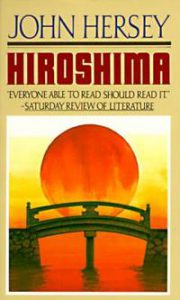
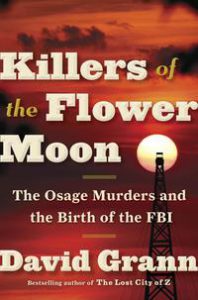 From New Yorker staff writer David Grann, #1 New York Times best-selling author of The Lost City of Z, a twisting, haunting true-life murder mystery about one of the most monstrous crimes in American history In the 1920s, the richest people per capita in the world were members of the Osage Indian nation in Oklahoma. After oil was discovered beneath their land, they rode in chauffeured automobiles, built mansions, and sent their children to study in Europe. Then, one by one, the Osage began to be killed off. The family of an Osage woman, Mollie Burkhart, became a prime target. Her relatives were shot and poisoned. And it was just the beginning, as more and more members of the tribe began to die under mysterious circumstances. In this last remnant of the Wild West—where oilmen like J. P. Getty made their fortunes and where desperadoes like Al Spencer, the “Phantom Terror,” roamed—many of those who dared to investigate the killings were themselves murdered. As the death toll climbed to more than twenty-four, the FBI took up the case. It was one of the organization’s first major homicide investigations and the bureau badly bungled the case. In desperation, the young director, J. Edgar Hoover, turned to a former Texas Ranger named Tom White to unravel the mystery. White put together an undercover team, including one of the only American Indian agents in the bureau. The agents infiltrated the region, struggling to adopt the latest techniques of detection. Together with the Osage they began to expose one of the most chilling conspiracies in American history. In Killers of the Flower Moon, David Grann revisits a shocking series of crimes in which dozens of people were murdered in cold blood. Based on years of research and startling new evidence, the book is a masterpiece of narrative nonfiction, as each step in the investigation reveals a series of sinister secrets and reversals. But more than that, it is a searing indictment of the callousness and prejudice toward American Indians that allowed the murderers to operate with impunity for so long. Killers of the Flower Moon is utterly compelling, but also emotionally devastating.
From New Yorker staff writer David Grann, #1 New York Times best-selling author of The Lost City of Z, a twisting, haunting true-life murder mystery about one of the most monstrous crimes in American history In the 1920s, the richest people per capita in the world were members of the Osage Indian nation in Oklahoma. After oil was discovered beneath their land, they rode in chauffeured automobiles, built mansions, and sent their children to study in Europe. Then, one by one, the Osage began to be killed off. The family of an Osage woman, Mollie Burkhart, became a prime target. Her relatives were shot and poisoned. And it was just the beginning, as more and more members of the tribe began to die under mysterious circumstances. In this last remnant of the Wild West—where oilmen like J. P. Getty made their fortunes and where desperadoes like Al Spencer, the “Phantom Terror,” roamed—many of those who dared to investigate the killings were themselves murdered. As the death toll climbed to more than twenty-four, the FBI took up the case. It was one of the organization’s first major homicide investigations and the bureau badly bungled the case. In desperation, the young director, J. Edgar Hoover, turned to a former Texas Ranger named Tom White to unravel the mystery. White put together an undercover team, including one of the only American Indian agents in the bureau. The agents infiltrated the region, struggling to adopt the latest techniques of detection. Together with the Osage they began to expose one of the most chilling conspiracies in American history. In Killers of the Flower Moon, David Grann revisits a shocking series of crimes in which dozens of people were murdered in cold blood. Based on years of research and startling new evidence, the book is a masterpiece of narrative nonfiction, as each step in the investigation reveals a series of sinister secrets and reversals. But more than that, it is a searing indictment of the callousness and prejudice toward American Indians that allowed the murderers to operate with impunity for so long. Killers of the Flower Moon is utterly compelling, but also emotionally devastating.
Charlie Rose interviews the author:
https://charlierose.com/videos/30603
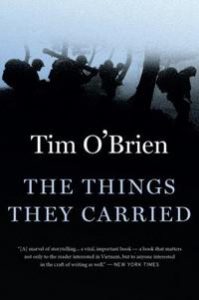 A classic work of American literature that has not stopped changing minds and lives since it burst onto the literary scene, The Things They Carriedis a ground-breaking meditation on war, memory, imagination, and the redemptive power of storytelling. The Things They Carrieddepicts the men of Alpha Company: Jimmy Cross, Henry Dobbins, Rat Kiley, Mitchell Sanders, Norman Bowker, Kiowa, and the character Tim O’Brien, who has survived his tour in Vietnam to become a father and writer at the age of forty-three. Taught everywhere from high school classrooms to graduate seminars in creative writing it has become required reading for any American and continues to challenge readers in their perceptions of fact and fiction, war and peace, courage and fear and longing. The Things They Carried won France’s prestigious Prix du Meilleur Livre Etranger and the Chicago Tribune Heartland Prize; it was also a finalist for the Pulitzer Prize and the National Book Critics Circle Award., A classic, life-changing meditation on war, memory, imagination, and the redemptive power of storytelling, with more than two-million copies in print Depicting the men of Alpha Company-Jimmy Cross, Henry Dobbins, Rat Kiley, Mitchell Sanders, Norman Bowker, Kiowa, and the character Tim O’Brien, who survived his tour in Vietnam to become a father and writer at the age of forty-three-the stories in The Things They Carried opened our eyes to the nature of war in a way we will never forget. It is taught everywhere, from high school classrooms to graduate seminars in creative writing, and in the decades since its publication it has never failed to challenge our perceptions of fact and fiction, war and peace, and courage, longing, and fear., Tim O’Brien’s modern classic that reset our understanding of fiction, nonfiction, and the way they can work together, as well as our understanding of the Vietnam war and its consequences.
A classic work of American literature that has not stopped changing minds and lives since it burst onto the literary scene, The Things They Carriedis a ground-breaking meditation on war, memory, imagination, and the redemptive power of storytelling. The Things They Carrieddepicts the men of Alpha Company: Jimmy Cross, Henry Dobbins, Rat Kiley, Mitchell Sanders, Norman Bowker, Kiowa, and the character Tim O’Brien, who has survived his tour in Vietnam to become a father and writer at the age of forty-three. Taught everywhere from high school classrooms to graduate seminars in creative writing it has become required reading for any American and continues to challenge readers in their perceptions of fact and fiction, war and peace, courage and fear and longing. The Things They Carried won France’s prestigious Prix du Meilleur Livre Etranger and the Chicago Tribune Heartland Prize; it was also a finalist for the Pulitzer Prize and the National Book Critics Circle Award., A classic, life-changing meditation on war, memory, imagination, and the redemptive power of storytelling, with more than two-million copies in print Depicting the men of Alpha Company-Jimmy Cross, Henry Dobbins, Rat Kiley, Mitchell Sanders, Norman Bowker, Kiowa, and the character Tim O’Brien, who survived his tour in Vietnam to become a father and writer at the age of forty-three-the stories in The Things They Carried opened our eyes to the nature of war in a way we will never forget. It is taught everywhere, from high school classrooms to graduate seminars in creative writing, and in the decades since its publication it has never failed to challenge our perceptions of fact and fiction, war and peace, and courage, longing, and fear., Tim O’Brien’s modern classic that reset our understanding of fiction, nonfiction, and the way they can work together, as well as our understanding of the Vietnam war and its consequences.
Side reads:
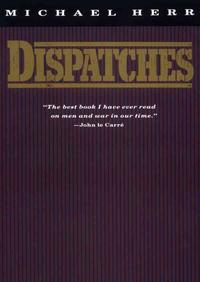 “Dispatches” by Michael Herr. According to John Wolcott, who served in Viet Nam, this accurately captures the life of a grunt. One of the greatest examples of war journalism ever written, Michael Herr’s clearheaded yet unsparing retellings of the day-to-day events in Vietnam take on the force of poetry, finding clarity in one of the most incomprehensible events in our modern era. A National Book Critics Circle finalist and highly acclaimed upon its publication, Dispatches still retains its resonance as America finds itself amidst another military quagmire.
“Dispatches” by Michael Herr. According to John Wolcott, who served in Viet Nam, this accurately captures the life of a grunt. One of the greatest examples of war journalism ever written, Michael Herr’s clearheaded yet unsparing retellings of the day-to-day events in Vietnam take on the force of poetry, finding clarity in one of the most incomprehensible events in our modern era. A National Book Critics Circle finalist and highly acclaimed upon its publication, Dispatches still retains its resonance as America finds itself amidst another military quagmire.
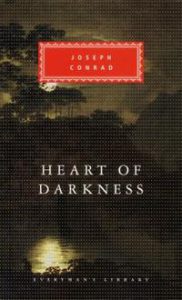 “Heart of Darkness” by Joseph Conrad. Charles Marlow is a steamboat captain on the River Thames near Gravesend England. He and his crew work for an ivory trading company. One day he recounts to his fellow crew the story of his life and how he became a captain for the steam boat company. The focus of his story involves the journey Marlow undertook to the outer reaches of the company’s operations. Here he tells of his wild encounters with Mr. Kurtz, a man with a great reputation for bringing in the most ivory for the company. Kurtz is widely respected by the natives, yet Marlow has some differing opinions as he struggles to understand Kurtz’s way of life, while uncovering secrets about the strange way Kurtz conducts his business.
“Heart of Darkness” by Joseph Conrad. Charles Marlow is a steamboat captain on the River Thames near Gravesend England. He and his crew work for an ivory trading company. One day he recounts to his fellow crew the story of his life and how he became a captain for the steam boat company. The focus of his story involves the journey Marlow undertook to the outer reaches of the company’s operations. Here he tells of his wild encounters with Mr. Kurtz, a man with a great reputation for bringing in the most ivory for the company. Kurtz is widely respected by the natives, yet Marlow has some differing opinions as he struggles to understand Kurtz’s way of life, while uncovering secrets about the strange way Kurtz conducts his business.
This book inspired the movie “Apocalypse Now”.
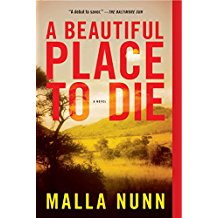 Award-winning screenwriter Malla Nunn delivers a stunning and darkly romantic crime novel set in 1950s apartheid South Africa, featuring Detective Emmanuel Cooper — a man caught up in a time and place where racial tensions and the raw hunger for power make life very dangerous indeed.
Award-winning screenwriter Malla Nunn delivers a stunning and darkly romantic crime novel set in 1950s apartheid South Africa, featuring Detective Emmanuel Cooper — a man caught up in a time and place where racial tensions and the raw hunger for power make life very dangerous indeed.
In a morally complex tale rich with authenticity, Nunn takes readers to Jacob’s Rest, a tiny town on the border between South Africa and Mozambique. It is 1952, and new apartheid laws have recently gone into effect, dividing a nation into black and white while supposedly healing the political rifts between the Afrikaners and the English. Tensions simmer as the fault line between the oppressed and the oppressors cuts deeper, but it’s not until an Afrikaner police officer is found dead that emotions more dangerous than anyone thought possible boil to the surface.
When Detective Emmanuel Cooper, an Englishman, begins investigating the murder, his mission is preempted by the powerful police Security Branch, who are dedicated to their campaign to flush out black communist radicals. But Detective Cooper isn’t interested in political expediency and has never been one for making friends. He may be modest, but he radiates intelligence and certainly won’t be getting on his knees before those in power. Instead, he strikes out on his own, following a trail of clues that lead him to uncover a shocking forbidden love and the imperfect life of Captain Pretorius, a man whose relationships with the black and coloured residents of the town he ruled were more complicated and more human than anyone could have imagined.
The first in her Detective Emmanuel Cooper series, A Beautiful Place to Die marks the debut of a talented writer who reads like a brilliant combination of Raymond Chandler and Graham Greene. It is a tale of murder, passion, corruption, and the corrosive double standard that defined an apartheid nation.
Recommended by Jan Selkowitz
Side read: Born a Crime by Trevor Noah
